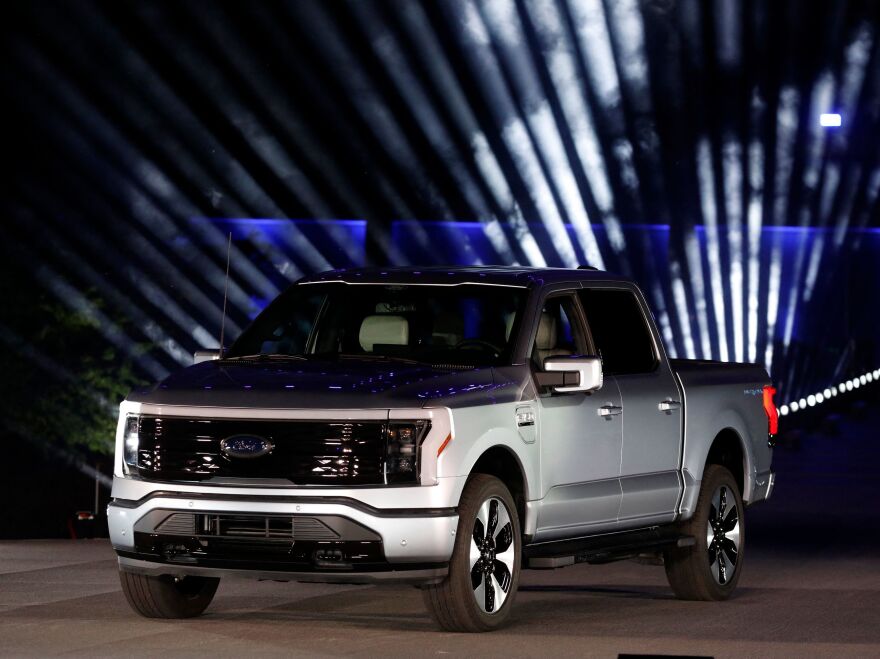Electric automaker Rivian hit public markets with a big splash.
Rivian shares surged in their first day of trading on Wednesday, after the company completed one of the largest initial public offerings in U.S. history.
The shares have settled slightly after the initial pop, but the company is still valued at close to $100 billion — a larger market capitalization than Ford or General Motors has, although not as high as Tesla's mind-boggling $1 trillion valuation.
It's a lot for a company that has built only a couple of hundred vehicles and hasn't turned a profit yet. But Rivian is hoping to echo Tesla's vertiginous rise from automotive startup to mass-market manufacturer.
It plans to sell pickup trucks, SUVs and a delivery vehicle, and it counts Amazon and Ford as some of its key shareholders.
Here's why Rivian is attracting so much buzz.
Electric vehicles are hot
Companies may disagree about how quickly a transition to electric vehicles will happen, but the entire industry is embracing the idea that battery-powered vehicles are the future.
At the COP26 climate talks on Wednesday, dozens of governments and companies embraced a target of selling only zero-emission vehicles by 2040 — or 2035 in major markets. It essentially means replacing every new gas- or diesel-powered vehicle with an electric one.

The scale of that transition is huge, posing a big challenge for existing automakers — and an opening for new entrants in the market.
"There's a lot of opportunity," says Stephanie Brinley, an analyst with IHS Markit. "And, of course, the meteoric rise of Tesla has whetted the appetite for who can do it again."
Tesla is currently the world's most valuable automaker, despite producing fewer vehicles than its rivals.
Rivian won the race to build the first electric pickup truck
Americans love pickup trucks and drop a lot of money on them, so automakers were competing to bring the first battery-powered truck to market. Rivian won that race, starting deliveries of its R1T this fall.
The R1T starts at $67,500 and is marketed toward outdoor enthusiasts. One optional feature is a pullout kitchen with an induction stovetop and a sink, designed for cooking at campsites. It pairs adventure-oriented specs with a luxurious interior; CNN called it a "glamper's dream truck."
Rivian may have been the first electric pickup to market, but it won't be the last.
Established automakers are launching electric versions of their pickup trucks, including Ford, the maker of the bestselling pickup in America.
"It will be challenging for Rivian to compete with the bigger, cheaper Ford F-150 Lightning when it becomes available, and the competition in the space will grow even fiercer as GM is also expected to unveil its all-electric Silverado at CES next year," says Jessica Caldwell, executive analyst at Edmunds, referring to a popular technology trade conference.
But for now, Rivian has the advantage of timing — and the vehicle's performance is getting good reviews, including a glowing assessment from Edmunds' on-road testing team.

It's also targeting the commercial delivery market
Rivian has another major advantage: It has a huge deal with Amazon to build electric delivery trucks. Amazon invested a lot of cash in the startup and owns a sizable stake in Rivian.
The retail giant has committed to buying 100,000 delivery vehicles from Rivian — a big deal for the fledgling automaker.
That's as many vehicles as Tesla is due to deliver to rental-car company Hertz in a deal that sent shares in the electric automaker sharply higher.
Other electric automakers have stumbled
A bunch of startups have tried to re-create the Tesla magic, with spotty success.
Hydrogen-truck company Nikola and electric-pickup maker Lordstown have been investigated by the Securities and Exchange Commission after fraud allegations, while other companies have just disappointed with repeated delays in their promised vehicles and with their underperforming stocks.
Some analysts think Rivian is better positioned than its rivals, particularly because it has demonstrated it can build its product.
"Rivian, for the most part, has kind of been a little bit more nose to the grindstone and doing the work and getting it done," Brinley, from IHS Markit, says.
One other electric-vehicle startup can say the same: Lucid, which went public this year through a different route, also started deliveries of its luxury electric sedan. It currently has a market cap of around $70 billion.

Still, scaling up will be a huge challenge for Rivian
Delivering a vehicle to consumers was a major achievement for Rivian, but volumes are still small.
Rivian has tens of thousands of preorders but expects to deliver only 1,000 vehicles by the end of 2021. The company's factory in Normal, Ill., can hypothetically produce hundreds of thousands of vehicles, but Brinley says to be truly sustainable, Rivian will need to expand to more plants.
"Let's not put the cart before the horse," says Asad Hussain, a mobility analyst with PitchBook. "I think the real challenge is going to be ramping up that manufacturing capacity."
The IPO should help. Its listing brought in nearly $12 billion for Rivian, a cash infusion the company will use to tackle that challenging problem of scaling up.
Copyright 2021 NPR. To see more, visit https://www.npr.org.


